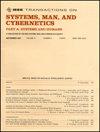Dynamic Community Evolution Analysis Framework for Large-Scale Complex Networks Based on Strong and Weak Events
IEEE Transactions on Systems Man and Cybernetics Part A-Systems and Humans
Pub Date : 2021-10-01
DOI:10.1109/TSMC.2019.2960085
引用次数: 13
Abstract
Community evolution remains a heavily researched and challenging area in the analysis of dynamic complex network structures. Currently, the primary limitation of traditional event-based approaches for community evolution analysis is the lack of strict constraint conditions for distinguishing evolutionary events, which entails that as the cardinality of discovered events increases, so does the number of redundant events. Another limitation of existing approaches is the lack of consideration for weak events. Weak events can be generated by small changes in communities, which are empirically prevalent, and are typically not captured by traditional events. To manage these two aforementioned limitations, this research aims to formalize a weak and strong events-based framework, which includes the following newly discovered events: “weak shrink,” “weak expand,” “weak merge,” and “weak splity” predicated on the community overlapping degree and community degree membership, this article refines these traditional strong events, as well as new constraints for weak events. In addition, a community evolution mining framework, which is based on both strong and weak events, is proposed and denoted by a weak-event-based community evolution method (WECEM). The framework can be summarized by the following: 1) communities in complex networks with adjacent time-stamps are compared to determine the community overlapping degree and community membership degree; 2) the values of the community overlapping degree and membership degree meet the definition of events; and 3) weak events are effectively identified. Extensive experimental results, on real and synthetic data sets consisting of dynamic complex networks and online social networks, demonstrate that WECEM is able to identify weak events more effectively than traditional frameworks. Specifically, WECEM outperforms traditional frameworks by 22.9% in the number of discovered strong events. The detection accuracy of evolutionary events is approximately 12.2% higher than that of traditional event-based frameworks. It is also worth noting that, as the cardinality of the data grows, the proposed framework, when compared with traditional frameworks, can more effectively, and efficiently, mine large-scale complex networks.基于强弱事件的大型复杂网络动态群落演化分析框架
在动态复杂网络结构分析中,群落演化一直是一个研究较多且具有挑战性的领域。目前,传统的基于事件的群体进化分析方法的主要局限性是缺乏严格的约束条件来区分进化事件,这意味着随着发现事件的基数增加,冗余事件的数量也会增加。现有方法的另一个限制是缺乏对弱事件的考虑。弱事件可以由社区中的小变化产生,这些变化在经验上很普遍,通常不会被传统事件捕获。为了克服上述两个限制,本研究旨在形式化一个基于弱事件和强事件的框架,该框架包括基于社区重叠度和社区隶属度的新发现的“弱收缩”、“弱扩张”、“弱合并”和“弱分裂”事件,本文对这些传统的强事件进行了细化,并对弱事件进行了新的约束。此外,提出了一种基于强弱事件的社区演化挖掘框架,并用基于弱事件的社区演化方法(WECEM)来表示。该框架可以概括为:1)比较具有相邻时间戳的复杂网络中的群落,确定群落的重叠度和隶属度;2)社团重叠度和隶属度值满足事件定义;3)有效识别弱事件。在由动态复杂网络和在线社交网络组成的真实和合成数据集上进行的大量实验结果表明,WECEM能够比传统框架更有效地识别弱事件。具体来说,在发现的强事件数量上,WECEM比传统框架高出22.9%。与传统的基于事件的框架相比,进化事件的检测精度提高了约12.2%。值得注意的是,随着数据基数的增长,与传统框架相比,所提出的框架可以更有效、更高效地挖掘大规模复杂网络。
本文章由计算机程序翻译,如有差异,请以英文原文为准。
求助全文
约1分钟内获得全文
求助全文
来源期刊
自引率
0.00%
发文量
1
审稿时长
6.0 months
期刊介绍:
The scope of the IEEE Transactions on Systems, Man, and Cybernetics: Systems includes the fields of systems engineering. It includes issue formulation, analysis and modeling, decision making, and issue interpretation for any of the systems engineering lifecycle phases associated with the definition, development, and deployment of large systems. In addition, it includes systems management, systems engineering processes, and a variety of systems engineering methods such as optimization, modeling and simulation.

 求助内容:
求助内容: 应助结果提醒方式:
应助结果提醒方式:


